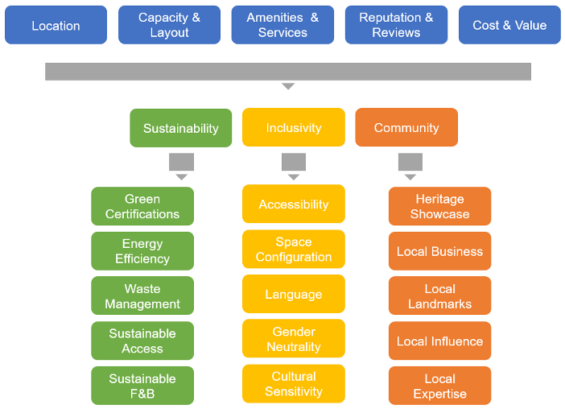Three Ways to Evaluate Business Events Spaces
November 01, 2023
Destinations looking to attract meeting planners need to evaluate business events strategies in order to ensure they are responding to planners’ needs. Having the right physical space and price point are among the minimum selling points to attract planners from around the world. Looking deeper into your convention center’s practices, however, can reveal blind spots that you can fix to become more attractive to decision makers.
Create your own scorecard if you’d like, or use something like the following to assess how competitive of an edge your convention center and business events spaces have. While location, capacity, amenities, reputation, and value should all be baseline centerpieces of your convention center offer, the following categories related to sustainability, inclusivity, and community are what will make the difference when it comes to standing out in front of meeting planners.

1. Sustainability
If your convention center is truly embracing sustainability, it should be easy to score a five out of five, if using our criteria – one point for each green box. First, consider any and all green certifications to make sure you have applied for any local labels that you can. Also assess your energy efficiency to make sure your center is maximizing things like solar power and renewable sources, like Milan’s Allianz MiCo, for example. When it comes to waste management, ensure that your recycling and composting capabilities are maxed out to send as little as possible to landfills.
Work with your local authorities to assess and improve any transportation or accessibility issues to help reduce carbon imprints as much as possible for attendees to your convention center. Also evaluate business events to be sure food and beverage options are as green as possible, including donating unused consumables and eliminating single use plastics.
2. Inclusivity
Inclusivity is a big word, and evaluating business events practices related to it can seem daunting, if not interminable. To get you started, check off the yellow boxes as you consider how your convention center space provides accessibility to ensure everyone can physically enter. Are entrances and exits accessible, and is the layout of your convention center facilitating movement for all, regardless of mobility?
Inclusivity, however, is not just about having accessible spaces for visitors, but also about language. Evaluate if global populations can access your convention center efficiently and if materials and signage are sufficiently clear or translatable. Also consider gender neutral facilities to be sure that there are no roadblocks to keeping everyone comfortable and happy. Take further steps to assess whether or not your venue is culturally sensitive, as well, which could mean it provides Kosher or Halal catering options among a host of other factors.
3. Community
Another way to evaluate your convention center is to assess how connected it is to your community. Again, there are dozens of ways to do this, but these five considerations in the orange boxes are solid jumping off points. Identify how – if at all – you showcase your local heritage in your convention center. For example, consider how local landmarks are incorporated into your space to double down on your convention center’s location to keep it tied to the destination.
Additionally, dig deep to understand how your convention center highlights local businesses and local experts in meetings and events to make sure they are maximized. Look for other local influences that flow through your entire experience – from food and art to traditions and natural resources – to help align your convention center with your local community instead of slipping into a more generic business event center. Seattle’s new Summit building offers a glimpse into how these factors can manifest themselves, showcasing how a thriving business events industry ultimately exists to serve the local communities.
Considering ways to make your convention center more attractive to meeting planners who want the most engaging destination experiences for their events? DCI has more than 60 years of working with destinations to promote their convention centers. Contact pamela.laite@aboutdci.com to learn more about how we can assist you in your goals.
